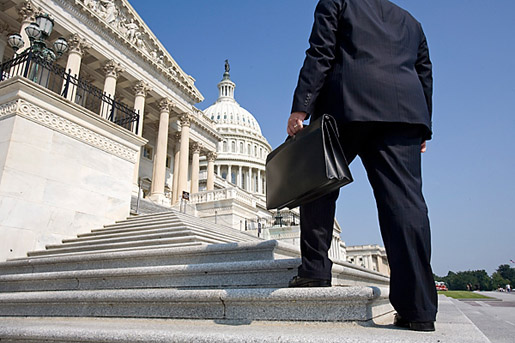


Putting the legislative package together is the obvious intention of Senate Republican leadership traveling to Mar-a-Lago to discuss the best process for the Border Security, Tax and Energy proposals.
President Trump initially wanted one big legislative package under reconciliation rules that permits Republicans to pass the legislation without Democrat party input. House Speaker Mike Johnson supported the same approach. However, the Senate republicans are worried they would have a harder time getting their personal indulgences in one bill.
Their Senate bribery system, their personal payment process through lobbyists, actually works better if they can negotiate each legislative proposal separately. Breaking the legislation into separate bills, especially the tax stuff, makes the payments from lobbyists much more targeted and lucrative.
WASHINGTON DC – Senate Majority Whip John Barrasso (R-Wyo.) told reporters earlier Monday that Senate Republicans would soon be meeting with Trump “and talk about what he’d like to have done.”
“We’re all heading in exactly the same direction where we want to get to,” Barrasso told reporters, though he declined to discuss any details of the planned meeting.
Various House Republicans are expected to go down to Mar-a-Lago for meetings on reconciliation priorities throughout the weekend.
Trump endorsed the one-bill strategy for the tax, border and energy package on Sunday night on Truth Social. But he indicated he was still open to a two-track strategy in public comments on Monday.
Senate Majority Leader John Thune has backed a two-bill strategy, though he was careful not to emphasize that position Monday after Trump’s comments. But Ways & Means Chair Jason Smith (R-Mo.) has pushed to put everything in one large bill, a strategy that has support from Speaker Mike Johnson. (read more)

Technically, corporations (special interest group) write the legislation that is being discussed here. Lobbyists then take the specific elements of the law they need adjustment and go find politician(s) to support it. Politicians get support from their peers using tenure and status etc. Eventually, if things go according to norm, the legislation gets a vote.
Within every step of the process there are expense account lunches, dinners, trips, venue tickets and a host of other customary financial way-points to generate/leverage a successful outcome. The amount of money spent is proportional to the benefit derived from the outcome.
The important part to remember is that the origination of the entire process is EXTERNAL to congress.
Regardless of how much they frame their authorship, congress does not write the laws or legislation, special interest groups do. Lobbyists are paid, some very well paid, to get politicians to go along with the need of the legislative group.
When you are voting for a Congressional Rep or a U.S. Senator you are not voting for a person who will write laws. Your rep only votes on legislation to approve or disapprove of constructs that are written by outside groups and sold to them through lobbyists who work for those outside groups.
While all of this is happening the same outside groups who write the laws are providing money for the campaigns of the politicians they need to pass them. This construct sets up the quid-pro-quo of influence, although much of it is fraught with plausible deniability.
This is the way legislation is created.
If your frame of reference is not established in this basic understanding you can often fall into the trap of viewing a politician, or political vote, through a false prism. The modern origin of all legislative constructs is not within congress.
“we’ll have to pass the bill to, well, find out what is in the bill” etc. ~ Nancy Pelosi 2009
“We rely upon the stupidity of the American voter” ~ Johnathan Gruber 2011, 2012.
Once you understand this process you can understand how politicians get rich.
 When a House or Senate member becomes educated on the intent of the legislation, they have attended the sales pitch; and when they find out the likelihood of support for that legislation; they can then position their own (or their families) financial interests to benefit from the consequence of passage. It is a process similar to insider trading on Wall Street, except the trading is based on knowing who will benefit from a legislative passage.
When a House or Senate member becomes educated on the intent of the legislation, they have attended the sales pitch; and when they find out the likelihood of support for that legislation; they can then position their own (or their families) financial interests to benefit from the consequence of passage. It is a process similar to insider trading on Wall Street, except the trading is based on knowing who will benefit from a legislative passage.
The legislative construct passes from K-Street into the halls of congress through congressional committees. The law originates from the committee to the full House or Senate. Committee seats which vote on these bills are therefore more valuable to the lobbyists. Chairs of these committees are exponentially more valuable.
Now, think about this reality against the backdrop of the both the 2016 and 2024 Presidential Election. Border security, tax and energy policy legislation is passed based on ideology. In the aftermath of the 2016 election the system within DC was never structurally set-up to receive a Donald Trump “American Interests First” presidency.
If Hillary Clinton or Kamala Harris had won the election, their Oval Office desk would be filled with legislation passed by congress which they would have been signing. Heck, they’d have writer’s cramp from all of the special interest legislation, driven by special interest groups that supported their campaign, that would be flowing to their desk.
Why?
Simply because the authors of the legislation, the originating special interest and lobbying groups, were spending millions to fund the Clinton and Harris campaign. Hillary Clinton and Kamala Harris would be signing K-Street constructed special interest legislation to repay all of those donors/investors. Meanwhile, congress would be fast-tracking the passage because the same interest groups also fund the members of congress.
President Donald Trump winning the election threw a monkey wrench into the entire DC system…. In early 2017 the modern legislative machine was frozen in place.
The “America First” policies represented by candidate Donald Trump were not within the legislative constructs coming from the K-Street authors of the legislation. There were no MAGA lobbyists waiting on Trump ideology to advance legislation based on America First objectives.
As a result of an empty feeder system, in early 2017 congress had no bills to advance because all of the myriads of bills and briefs written were not in line with President Trump policy. There was simply no entity within DC writing legislation that was in-line with President Trump’s America-First’ economic and foreign policy agenda.
Exactly the opposite was true. All of the DC legislative briefs and constructs were/are antithetical to Trump policy. There were hundreds of file boxes filled with thousands of legislative constructs that became worthless when Donald Trump won the election.
Those legislative constructs (briefs) representing tens of millions of dollars’ worth of time and influence were just sitting there piled up in boxes under desks and in closets amid K-Street and the congressional offices. Legislation needed to be in-line with an entire new political perspective, and there was no-one, no special interest or lobbying group, currently occupying DC office space with any interest in synergy with Trump policy.
Think about the larger ramifications within that truism. That is also why there was/is so much opposition.
No legislation provided by outside interests means no work for lobbyists who sell it. No work means no money. No money means no expense accounts. No expenses mean politicians paying for their own indulgences etc.
Politicians were not happy without their indulgences, but the issue was actually bigger. No K-Street expenditures also means no personal benefit; and no opportunity to advance financial benefit from the insider trading system.
Without the ability to position personal wealth for benefit, why would a politician stay in office? The income of many long-term politicians on both Republican and Democrat sides of the aisle was completely disrupted by President Trump winning the election. That is one of the key reasons why so many politicians retired immediately thereafter.
When we understand the business of DC, we understand the difference between legislation with a traditional purpose and modern legislation with a financial and political agenda.
For 2024, the Trump team has pre-organized legislative proposals that fulfill the policy goals made during the campaign. The border security bill, the energy proposals and the tax proposals are all legislative constructs created independent of congress by allies of President Trump 2.0
The debate now is how do the Senators get paid by lobbyists when the lobbyists have not had control of the language within the legislative policy?
Thus, a meeting to Mar-a-Lago is needed to work out how the Senators can get paid, and what elements of the special interests will be included in the legislation. The tax policy is the trickiest, because the corporations need control over their specific loopholes.

